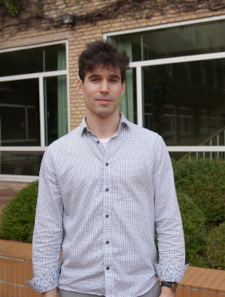
Daniel has his first Master’s degree in engineering physics from Portugal. After finishing the degree Daniel worked as a researcher on Soft and Printed Microelectronics in Portugal and the USA, followed by a year of voluntary work in several sustainability projects across Europe.
Some questions regarding science and technology had always accompanied him in his studies and in his work. One day, when he found out about a field called ‘science and technology studies’, he decided he wanted to have the chance to reflect on those questions more seriously. That was when he headed to a Master’s program called Science Studies at Aarhus University.
“It broadened my horizons. When I came here, I just thought, ‘wow, it’s a big field.’ And the degree is flexible, there’s a lot of freedom. It also means it’s a personal journey, and in my journey, I didn’t focus on one topic or direction; I explored: I did projects on the politics of technology and the sociology of science, on science for policy, also on the ethics and gender in the history of biomedical research, and my thesis on science theater. So I feel I could have continued.”
After he completed his new Master’s degree, one of the biggest challenges Daniel faced was actually explaining what Science Studies is in a simple and accurate manner. Even today, when asked, Daniel is still trying to find the perfect formulation, but he feels he hasn’t quite found it yet. Daniel also met another challenge in his search for a job in Denmark:
“I felt that I lacked some kind of a relevant student job or internship to help me in my career change, and this was because I was new to Denmark and was entering a new field. At the time, I didn’t know that it was so important. So, I met this competitiveness issue because all the others who were applying had some experience […]. By chance and perseverance, it all fell into place at end of the day.”
Now, Daniel works at Innovation Fund Denmark, managing the Danish participation in international partnerships – most of them under Horizon Europe – and working with grant administration with a focus on international projects. Those receiving the grants are both small and medium-sized enterprises and universities, as well as other public and private organizations. Innovation Fund Denmark is a public fund under the Danish Agency for Higher Education and Science. Its mandate is to promote a positive impact and growth in Denmark by solving societal challenges via research and innovation.
“In practice, a big part [of my work] at the International Collaborations team includes managing a small share of a large portfolio of EU programs where Innovation Fund Denmark is involved in together with international partners. It’s also about helping applicants and grantees who contact us daily with all kinds of questions. And it’s about monitoring the progress of projects after they have received the grants. My everyday work […] basically involves a lot of public administration. We are a public institution, and we have to follow specific rules to make sure that public funds are granted by the book and invested in the best projects having the best impact. Finally, another part of the work, which is also very exciting, is that I don’t work alone. I work a lot across the organization with the financial, legal and communication departments, and I get the chance to contribute to the governance of the organization and to be involved in strategical decisions. That suits me very well because I do like the big picture, and I like to work together with people.”
Daniel greatly leverages his knowledge from Science Studies in his work. The combination of engineering physics, research and Science Studies has been beneficial to him. However, the most important aspect that Science Studies has provided him is a highly nuanced understanding of the context in which he works, where science, technology and society mutually shape each other. Daniel now works at the interface between politics, researchers, and scientific and technological development; how and where should research be conducted? What areas are important for research and innovation? What developments are we heading towards and why? Understanding this context is something Daniel brings with him from Science Studies.
“Understanding the context in which I’m working makes a big difference because most of the challenges and motivations that we face when trying to make a better world trough research and innovation, they are never totally new […]. I [have] discussed many of them before in my courses [at Science Studies], although often from a very different, more academic, approach. I would say that I went from studying the interfaces between science, society, environment, and technology to operating at some of these cross-fields. As importantly, this understanding gives me a sense of direction and meaning in my everyday work. And at the same time, my job gives me the opportunity to keep being engaged in my core interests and learning more about them.”